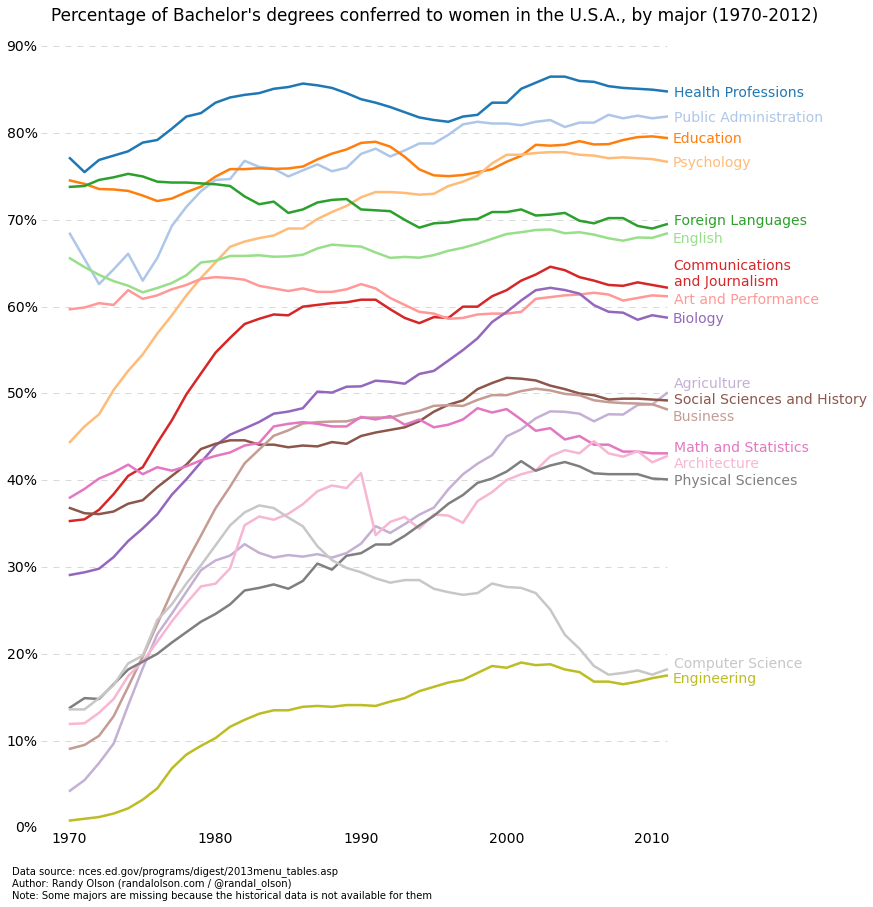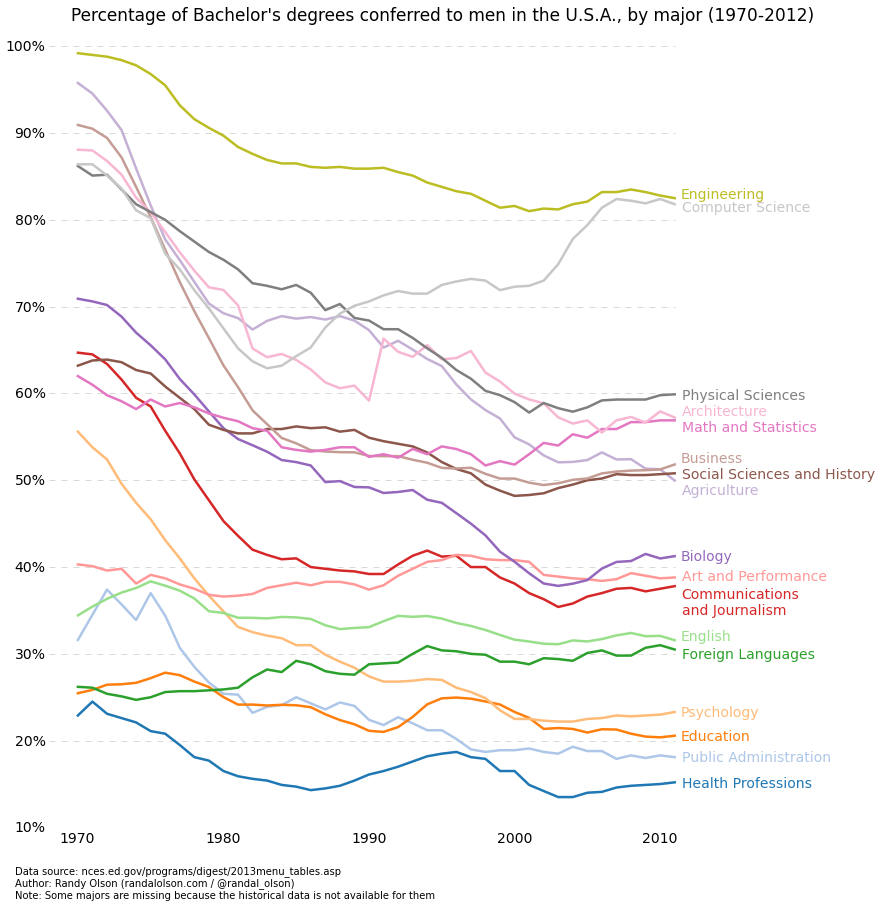- Percentage of Bachelor’s degrees conferred to women, by major (1970-2012); and
- The double-edged sword of gender equality.
 | |
| (Source: Randal S. Olson) |
 |
| (Source: Randal S. Olson) |
As Randal points out, the proportion of science and math baccalaureate degrees awarded to women has of late been around 40%. There's still a gap, especially since (if I recall correctly) women now comprise more than half the undergraduate population, but we have definitely made significant progress. I do have a wee bit of concern that the trend in math/statistics degrees was negative in the first decade of this millennium. Nonetheless, the gap in "S/M" degrees does not seem as bad as has sometimes been suggested. (Note that I was careful to use "/" and not "&" there.)
The "T/E" portion of STEM remains problematic, as signaled by the curves for Computer Science and Engineering, and there seems to be a fairly lengthy downward trend in the proportion of CS degrees awarded to women. (This is probably a more pressing concern for unwed heterosexual male CS majors than it is for me.) Various efforts to bolster female enrollments in "T/E", particularly engineering, are underway.
I'll end here with some related links.
Previous posts here:
Posts by Laura McLay (Punk Rock Operations Research blog):
- Too numerous to list. Just visit the blog, click the word "women" in the tag cloud ... and brace yourself.
What I also find interesting is the drop off women in mathematics in academia. From about ~40% graduating with degrees down to ~12% tenured faculty. I have seen studies into it before (which I'm failing to find), this is the best I could find at the moment: http://blog.tanyakhovanova.com/?p=320
ReplyDeleteThanks for the comment, and the link. One possible explanation (I can't recall where I saw this) is that measures of "quantitative ability" for both males and females in the US allegedly both follow normal distributions with roughly equal means, but with greater variance for males. I don't recall what age group(s) the source looked at, nor what measure was used (I believe some sort of standardized test score, obviously not a perfect measure of ability). If, for the sake of argument, we accept the premise of equal mean ability but lower variance for women, then it makes sense that as we raise the ability requirement (say from bachelors degree to masters to doctorate to tenure-worthy publication rate), a higher proportion of males than of females will make the cut. The opposite is also true: a higher proportion of men than of women will be mathematically dysfunctional. (The budget-challenged, predominantly male US Congress provides some supporting evidence for this hypothesis.)
DeleteI'm not sure if I buy the argument, and I seem to recall reading somewhere that math scores elsewhere (Europe?) do not show the same mean for both genders. Issues of balancing work and home lives (especially child care) may also play a role, although (a) the drop-off in tenured faculty seems worse in math than in some other disciplines (and the life-style effect should be uncorrelated with discipline) and (b) mathematicians can work from home more readily than people with labs (scientists, engineers).
There still seem to be societal factors keeping the "girls can't do math" nonsense alive. In one of my other posts, I linked an article about how that can create uncertainty that triggers physiological responses. I wonder if it is possible that, even after receiving bachelors or masters degrees, more women than men doubt their own ability to continue deeper into math?
Rachel:
DeleteThe social pressure issues probably exist in the US too, although from first-hand experience I can say that at least some universities here will do "spousal hires", which means finding a position for the spouse of someone they really, really want to get. In some cases "really, really want to get" means "Nobel or Fields prize winner" or "young research start", but in some cases it means "will add diversity". So I think that, at least at the margin, a woman in OR or other STEM fields with a good pedigree can get a faculty position and, if her spouse is a professor, have a good chance that he will also get a position (possibly tenure track, but not guaranteed), keeping the family together. If the spouse is non-academic, that's another matter.
Your comments about self-doubt resonate with an op-ed piece in the Washington Post that a friend brought to my attention: http://www.washingtonpost.com/opinions/catherine-rampell-women-should-embrace-the-bs-in-college-to-make-more-later/2014/03/10/1e15113a-a871-11e3-8d62-419db477a0e6_story.html. For what it's worth, males (including myself) also experience the sense that people consider them more competent than they are. Perhaps a Y chromosome facilitates soldiering past those doubts. It would be interesting to know (a) whether women really are more susceptible to self-doubt (i.e., statistical rather than anecdotal evidence), and if so (b) what causes it and (c) what we can do to ameliorate it.
Oh, great! Where was that "gender equity" in math when I was young enough to possibly attract one of the females??
ReplyDeleteApparently we've been spelling STEM wrong all along. Per the Census Bureau, it should be PSTEM. I guess what threw us off was that the P (for "Pseudo") is silent.
One of the things skewing the job classification statistics, besides the inclusion of multidisciplinary whatever as STEM, is that jobs for mathematicians (and, to some extent, statisticians) frequently don't have STEM-sounding titles. If you are an electrical engineer doing engineering work in a corporation, you're probably in an engineering department in a job classified by the company as engineer. If you're a math/stat grad doing predictive analytics in a marketing department, I suspect the job is classified (at least by the Census Bureau) as marketing. When I was teaching (mostly) management science in the B-school, I'll bet the Census Bureau had me listed as "business", "education" or "underemployed" rather than considering that a STEM job, even though I was hired specifically due to STEM credentials. (Well, technically they were Statistics & Math credentials, but I don't want former students weighing in with S&M references.)
Thanks for the comment and links.